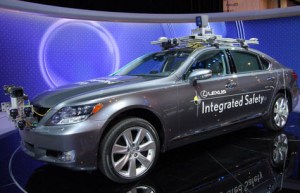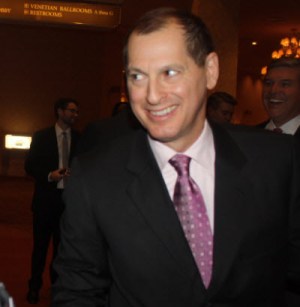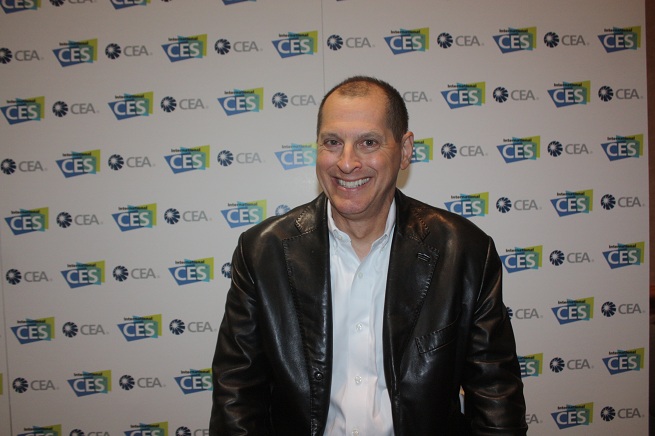
Above: Las Vegas has just enough rooms for CES.
VB: Has Las Vegas itself changed much, adding more hotel space or anything like that?
Shapiro: For years, it was 10,000 new rooms a year. It’s slowed down now. They have some plans for the next few years that are really positive, but right now it’s a very gradual increase in rooms. They still have more hotel rooms than any city in the world. They’re about at the 150,000 mark, give or take. And then there are people who rent places that we don’t count, or do day trips. We’re comfortable with 150,000 people. That’s where I would like us to stay.
As far as the mix of those people, we’ve seen an upward spike in international attendees. This is a huge global event. But we don’t know until we finish the show and do an independent audit. They tell us exactly what number we can use.

Above: Cars are outfitted with tons of electronics now.
VB: Do you still get around 5,000 or so journalists?
Shapiro: Yeah. Again, that’s the same kind of category. We don’t know until after the show because some people register on site or pre-register and don’t show up. The official numbers are comparable to last year, though, looking at our 2013 finals versus what we’re expecting. We’re at 35,000 international. That’s what we had last year. 5,000 media and analysts. 2,700 financial people. I see there is one change – we had 800 speakers last year and 850 this year. And 200 more exhibitors than last year, roughly. Exhibitors are always cancelling or showing up at the last minute.
VB: Another figure I saw was that there were 300 Apple-related accessory companies.
Shapiro: Yeah, the iLounge portion of the show is well over 300 companies exhibiting.
VB: I recall you were targeting 1.9 million square feet of space. That sounds slightly bigger than last year.
Shapiro: It is going to be bigger, yeah. Bigger than what we ended up with last year. That’s the bottom line. How much bigger depends on, again, what happens at the last minute. There’s still a waiting list in a lot of areas. We’re virtually sold out. The issue we’ve always had with this show, even last year, is that we’re space-limited. We couldn’t get the Sands Convention Center that we needed. For 2015, we will have it.
VB: Last year you mentioned Ultra HD as a hot product. Do you see more of these hot categories coming up, like wearables and so on?
Shapiro: We see a lot of things — 3D printing, Ultra HD. High-resolution audio is something we didn’t even talk about last year, but now Sony is going big there. So are a lot of other companies. We have a little TechZone focused around that, because for those of us who have been around forever, the big shock of MP3 the iPod was that you went down in quality. Now, with fast-growing categories like headphones, we’re finding people want greater quality audio. We’re working with the music industry and others. Companies are producing what we call high-resolution audio. Other trends are obviously robotics, sensor technology, digital health and fitness.

Above: Samsung’s Internet-connected fridge at CES last year.
VB: What are some of the issues that you care about?
Shapiro: We have 35 different tracks in our conference program – automotive, cloud computing, content and Hollywood, digital imaging, gaming, government regulation. If you’re talking about issues in Washington, that’s obviously the one. We just announced that the Secretary of Commerce is coming. I’ll be interviewing her on stage. We also have the new chairman of the FCC, Tom Wheeler, and the other FCC commissioners. Obviously spectrum is a huge issue. Some of the other big government issues are privacy, environmental issues, and energy efficiency.
VB: Has privacy become more heated because of the National Security Agency PRISM revelations this year?
Shapiro: Yes, obviously. But privacy was an issue last year. We’re very focused on the fact that any technology is—When the automobile came along, it caused accidents and people got hurt. The VCR affected Hollywood. The internet affected travel agents. Technology has implications.
The first role of government is to separate what has to be regulated and restricted, like with the Senate’s vote on legislation related to the 3D printing of guns. We haven’t taken a position on that. Just as in the case of the internet and child pornography or gambling, there are certain things that are bad, and society makes a decision that you shouldn’t do them. So we stay back.

Above: Gary Shapiro of CEA.
But then there are things that people complain about, and we see an issue where we have to oppose. You’ve covered all those battles over the years. We’ve gotten engaged in a whole range of issues over the years, for new things that are innovating and only threatening someone’s business model. It’s not protecting society from harm. That’s where we engage, whether it’s on behalf of Uber or Aereo or the Sony Betamax case or hundreds of other things.
VB: It was interesting to see that coalition form over the weekend, about what to do about government spying.
Shapiro: For a lot of reasons. It’s a big deal for trust issues. It’s a big deal for competitive reasons. If you’re considered a U.S. company now, it may be affecting your competitive status around the world. If you’re a Cisco or an Apple, people will say, “Oh, they’re Americans, they’ve been infiltrated.” There are serious ramifications. Even the car companies have to deal with these issues.
Some would argue that it’s a competitive position to be someone that’s totally trusted. Or you could look at Snapchat. That company has arguably prospered off of a concern about privacy and fear of leaving a trail. They’ve succeeded because kids are fearful of leaving tracks. The last five or ten years, their parents have been telling them – “Don’t do anything on the internet that will hurt you for your rest of their life.” They’ve gotten the message and a successful service was created around it.

